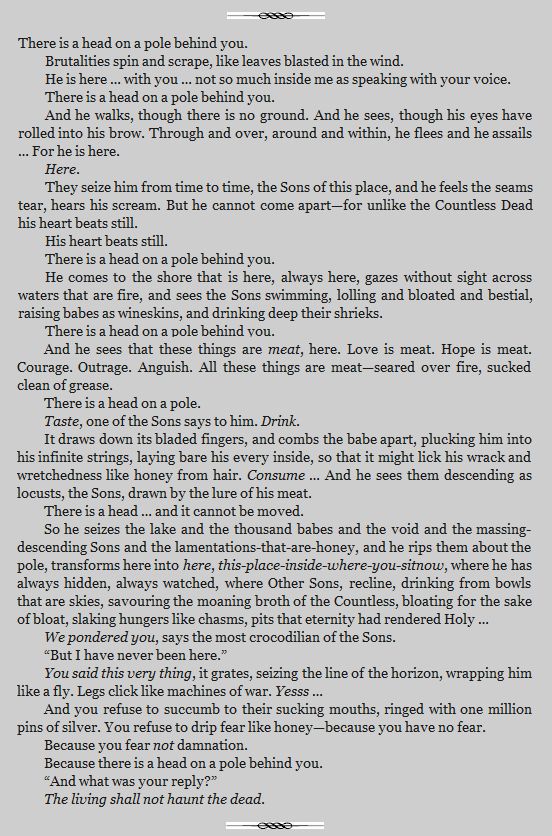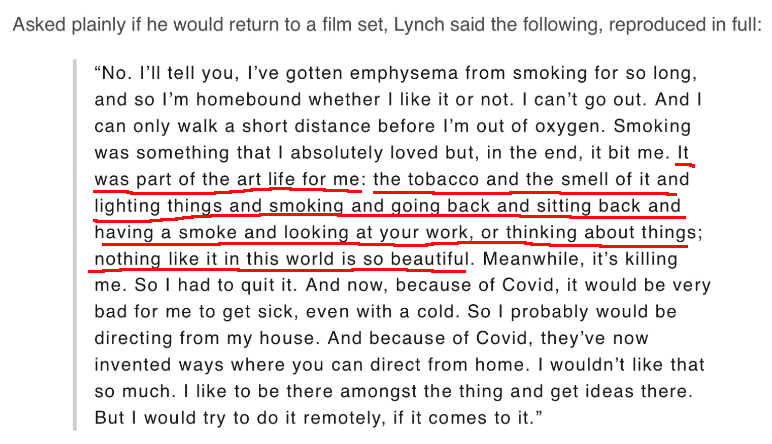I decided to take a look across the internet, trying to dodge spoilers. And I glimpsed two important aspects: the first is that this is seen as a rather unique passage in all the books, and that it doesn’t seem like Bakker clarifies it through what’s left for me to read.
This motivated me to write down here what I’m thinking. Through several rereads, across many days, there are layers to my thoughts and so many ideas going in different directions that I have no hope of retrieving from memory and archiving the whole of it. But at least if I write here what I currently have, at least I won’t lose that. I use this blog more for myself than communicating with the outside.
Let’s start from the end: “The living shall not haunt the dead.”
This is something that troubled me because I don’t have much to offer. It felt incongruous with the rest of the scene. But it comes here first because it comes first in the chapter. This is the first line, and it comes attached to a different part, with the men of the Great Ordeal eating Sranc. That line is appended there, so that it then returns to close the section I’m commenting here. But in the case of Sranc, it doesn’t tell me much… These are dead bodies being eaten, echoing what happens inside the section. The living aren’t haunting the dead, maybe the opposite since the sense of the first scene is some men complaining the practice of eating Sranc is changing them from the inside. “The meat.” “What of it?” “My… my soul… It grows more disordered because of it.”
There is more to the meat, but this we’ll see later. The living, here, aren’t haunting the dead, because the dead are dead and the living still living. This “divide” has been a theme in these last few books, and the line is thinning. But at this point there is no crossing over, and if anything those men are complaining something of those Sranc is lingering back, rather. I’m wary of considering the opposite because there are too many implications attached and what I’ve read up to this point isn’t very coherent with the idea going that way.
There is a head on a pole behind you.
While this is probably quite “troubling” for most fist-time Bakker readers, for me it makes instead an anchor. Or maybe it feels like one and I’m being fooled. But the first time I read this passage, for me it was a fixed point. Because I immediately linked it to this blog post.
It is the same concept that is familiar: the darkness that comes before. The head on a pole is yet another “fashioning” of the same concept. So the way I interpret its meaning is: you believe the movement of your thoughts are your own, but there’s something that comes before, here behind, that precedes your thoughts, shapes them and your actions. The key points are that you don’t control what you think you control, and more importantly, you have no perception of it. Same as the practical example in that blog, the “feature” of the head on the pole is to be perpetually just behind you. You cannot turn to see it. You have no direct perception of it.
All of this is reinforced at various points. This inner scene is surrounded by different pieces of the scene between Kellhus and Proyas. Right below the passage Kellhus is described as IMMOVABLE “in the eyes of his Exalt-General.” But he’s also controlling everything. He’s not so much in front of Proyas, but behind him, controlling and shaping each of his thoughts. “Kellhus had ruled Proyas’s heart, became the author of his every belief.”
“Kellhus could have reached out and behind him, manipulated the dark places of his soul.”
This much is quite clear, about the philosophical underpinnings of this “metaphor,” but not quite enough for me to see clearly through it… The following section is a huge problem:
He is here … with you … not so much inside me as speaking with your voice.
“He is”, should exclude this being the God of Gods, this scene is too authoritative to have slips like that. Who’s there? We don’t know. It’s Shakespearean. Who’s there? I am.
“With you.” Yes, it’s the same thing. He’s one with you. You think there’s one where there’s two. Master and manipulated. Kellhus and Proyas, in the example scene. One can be used to decode the other, even if the link may be less direct than this. This scene is not about Proyas, it’s about Kellhus in the Outside.
How does Kellhus reach the Outside? At this point of the book I have no idea. If it’s some kind of trance or meditation, like the Thousandfold Thought, then his consciousness wanders. Also meaning he’s in two places at once. So it started to open possibilities while I read. This, also, could be an anchor for Kellhus. He could either be the head, with the head on the pole behind him. Or he could be the head on the pole. Or, more likely, SEE through the head on the pole, like his anchor point in the Outside. But what to make of all this? I don’t know. It doesn’t coalesces into something usable, just suggestions.
“Not so much inside me as speaking with your voice.” This for me trips all over everything and why it is so confusing. We established there’s a “he.” We then established there’s a “you,” and he’s here with you. But then there’s a third. “Me.” This me, speaks with YOUR voice, and HE’S HERE.
Up to this point we were always playing with a double. Consciousness and preceding darkness. Master and slave. But it splits in three ways and I don’t know what to make of it, beside the fact that all of these three still coincide with the same point. There’s a he who speaks with your voice inside me. But if this voice is inside me, then how can it be other than MY voice? Again, the darkness that precedes. Who’s speaking here in the first place? Kellhus? It sounds incongruous.
But what if instead this is Kellhus talking to himself? It’s still incongruous for the way Kellhus has been shown before, but “you” could simply be self-reference. Your internal monologue that speaks to you as a double. “You’re really an idiot”, saying your internal voice, referring to yourself. Soooo… He’s here with me. Not so much inside me, but speaking with my voice.
I am being controlled. This is my voice, that I hear, but I’m not the one speaking.
We pondered you, says the most crocodilian of the Sons.
“But I have never been here.”
This “surprise” sounds like Kellhus. The further reply, “You said this very thing” is to me so clear that it’s probably misleading and false (more on this, at the very end). I just can’t see alternatives, and alternatives are what’s probably needed to decode the whole thing…
“And what was your reply?” (Kellhus? asks.)
“The living shall not haunt the dead.
And we’re back to the line that caps it all, but that for me means the LEAST. What we know is that this is spoken by one of the “Sons,” likely some kind of lesser gods in this Outside, or something pretending.
What does it mean? You should not be here. Only dead souls crowd the outside, to be eaten by the gods. This is HELL, after all. You should not be here. You are still alive … and there’s a head on a pole behind you. But do the gods know about the head on the pole? This is more likely Kellhus private knowledge. The head is an anchor point to the outside, to peer through? We don’t know.
Other parts here and there are easier to parse, or should be. Again, not because I’m smart, but because I’ve been onboard for a while, and read Bakker explain stuff through his blog. I often can see parallels between the story and the actual philosophy it comes from. So here we go:
“And he sees that these things are meat, here. Love is meat. Hope is meat. Courage. Outrage. Anguish. All these things are meat – seared over fire, sucked clean of grease.”
I immediately recognized this coming from a section of the blog, that I cannot find now. It was too many years ago. I don’t even remember if it was someone else in the comments. But it refers to a video. The concept is still at the foundation of eliminativism a science of human consciousness. There is no magic, it’s all basic science. Therefore the nature of emotions is still inscribed within the “meat.” Using the abstraction that we are just meat. Our brain is meat. Emotions have to be encoded within that same meat, if we accept there isn’t something “more.” The hard problem of consciousness. There are also different versions and I’m not sure the one that we used at the time, but the concept is the same. Even a cursory search through the blog offers some explicit quotes:
They need to understand that thoughts are made of meat. Cognition and communication are biological processes, open to empirical investigation and high dimensional explanations.
But how literally things are encoded here?
You can eat the brain of a wise man, without getting the wiser. Digestion would rather destroy that information, if we want to be literal. Already this is problematic, because this scene is in the Outside. If these are souls, how can they be meat? Maybe the parallel Bakker made isn’t direct at all and I’ve been mislead by prior knowledge, rather than helped?
So let’s stick to what’s written… Which doesn’t help. Because he’s offered that meat, whoever “he” is. The head on the pole cannot be moved (we’ve seen why), but here it appears to be used as a motive for what comes after. “He seizes the lake.” This seems quite an intentional stance, rather than a passive observer. Which is weird. The Sons, who are speaking and doing here, are also seized within the whole. “He rips them around the pole.” No idea what to make of this specifically. It may be as well bound to conceptual things Bakker uses for his ideas of time and place, but I never delved deep into that, and it’s complex stuff that would require time. “He transforms here into here,” and everything on that scene… But doesn’t seem to do anything with it. That phrase ends. He seems to wrap the whole place, but then what?
“You refuse to drip fear like honey – because you have no fear.”
Here the causal chain seems linked to the head on the pole. He has no fear of damnation… Because there is a head on the pole behind him. But let’s stick to the mention of fear, and go back.
Fear is just meat. It is encoded in the meat same as every other emotion or feeling. Fear is just meat… Because there is a head on a pole? More or less. Again, how literally things are encoded? Kellhus cannot be eaten. Because he’s not there. The living should not, can not, haunt the dead. He’s tricking them believing him being there, but he’s not.
But the moment you see things for what they are, the moment you shift the perspective back to the head on the pole, then you exit that personal consciousness. You understand the movement of a person’s soul. You know what is being moved, you know how. Kellhus knows how. He is inhuman in that way, the same as (well, not really) Non-men described later as “False-men”: “This is what made them False, inhuman … The way they made beasts of Men.” The same as Kellhus makes children of all Men. Toys. The bestial being used as “lesser than,” same as the Emwama in that scene.
As Dunyain, Kellhus has mastered fear. Not as simple control of one own’s emotions, but because fear is “explained away.” Once you have an understanding of reality, fear goes away, same as fear becomes just more “meat.” Once you have a fundamental description of reality, once you’re one with the world, you become fearless. Not so much as an act of will, but as an act of… physics. Fear is determined by what comes before. The nature of fear is for being incomplete and abrupt. To have no bridge between before and after. The moment you switch back to the perspective of the head on the pole, fear becomes at best a tool, not an emotion. By eating that meat you also eat fear, but in the sense that fear becomes illusory, same as consciousness is illusory. The appearance of something else.
Again, how literally things are encoded? Kellhus is not there (so he has nothing to fear, the Sons can’t get him), but he’s also fearless as a state of mind. But so is Theliopa:
“The bottomless indifference of her gaze was the only thing that terrified.”
“She gazed at him with piscine relentlessness, her pale blue eyes dead, void of passion. And for the first time he felt it … the menace of her inhuman intellect.”
“She looked like a thing graven, the goddess of some lesser race.”
I like how Bakker writes, because describing those “piscine eyes” he never flatters. The horror always lies in the truth of the mundane. And Bakker is a genius because Kelmomas sees her cunning, IN HER SKIRT (it’s not a pun, it’s like that).
But these considerations are beside the point. Is Theliopa also fearless? Is she… without a soul? That’s what I meant with “how things are encoded.” Because when it come to metaphysics we don’t know all that much, and it may be that achieving a certain impersonal otherness, the way of the Dunyain, may also translate with them being literal meat, without a soul. But there’s nothing indicating anything like this, up to this point, so this is another diversion trying to interpret this passage, leading nowhere.
We pondered you.
“But I’ve never been here.”
What if he had? This was my first idea. On the whole scene and the identity of the head on the pole.
“This was what his father’s Thousandfold Thought had made.”
“A pattern conquering patterns, reproducing on the scales of both insects and heavens; heartbeats and ages. All bound upon him.”
My guess was that the head on the pole is Moengus. But it may as well be a wrong guess. I’m still biased by the fact I don’t feel the end of the third book complete. I still rage at what I can’t come to terms there. And Bakker STILL teases me, right in this chapter. Moengus couldn’t explain why Kellhus had haloed hands. Here, Kellhus still has no idea why, either.
“He raised a hand into the dim air, gazed upon the nimbus of gold shining about them.”
“Such a remarkable thing.”
“So hard to explain.”
This is Kellhus. “Most failed to even notice his evasion.” I read this almost as if this is Bakker, also evading poignant questions, leaving just “odour of profundity.” Make believe. “They assumed they were being misdirected for some divine reason, in accordance to some greater design.”
This here is a dressing down, pretending to have greater answers where there’s none.
But it’s also a missing point. What’s the matter of the haloed hands? Miracle. Moengus was fooled, or maybe pretended to be, in order to enact. Kellhus doesn’t know. He’s being moved by a head on a pole behind him. By his father’s Thousandfold Thought.
He goes to the outside, but he only moved through the path his father already traveled before. Kellhus has never been there, but Moengus had.
“He was as much a creature of the Thought as it was a creature of him. For it whispered as it danced, threading the stacked labyrinths of contingency, filing through the gates of his daylight apprehension, becoming him.”
This is what I currently have. Which is a collection of SOME of the thoughts I had, just the more recent. I either write them down or lose them. As it happens, these moments stay clearer than what they become later on. So better hold on them while they are here…
(for example, I left out considerations about the first quote in the chapter about the game of Abenjukala, map and territory. It still is an example of occlusion. This was actually something I planned to start from, writing this whole thing, and now I can only stare dully at the page, wondering what I meant to write and then forgot… Sigh.)





